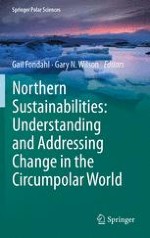2017 | OriginalPaper | Chapter
11. Signs of Non-recognition: Colonized Linguistic Landscapes and Indigenous Peoples in Chersky, Northeastern Siberia
Authors : Lena Sidorova, Jenanne Ferguson, Laur Vallikivi
Published in: Northern Sustainabilities: Understanding and Addressing Change in the Circumpolar World
Publisher: Springer International Publishing
Activate our intelligent search to find suitable subject content or patents.
Select sections of text to find matching patents with Artificial Intelligence. powered by
Select sections of text to find additional relevant content using AI-assisted search. powered by
